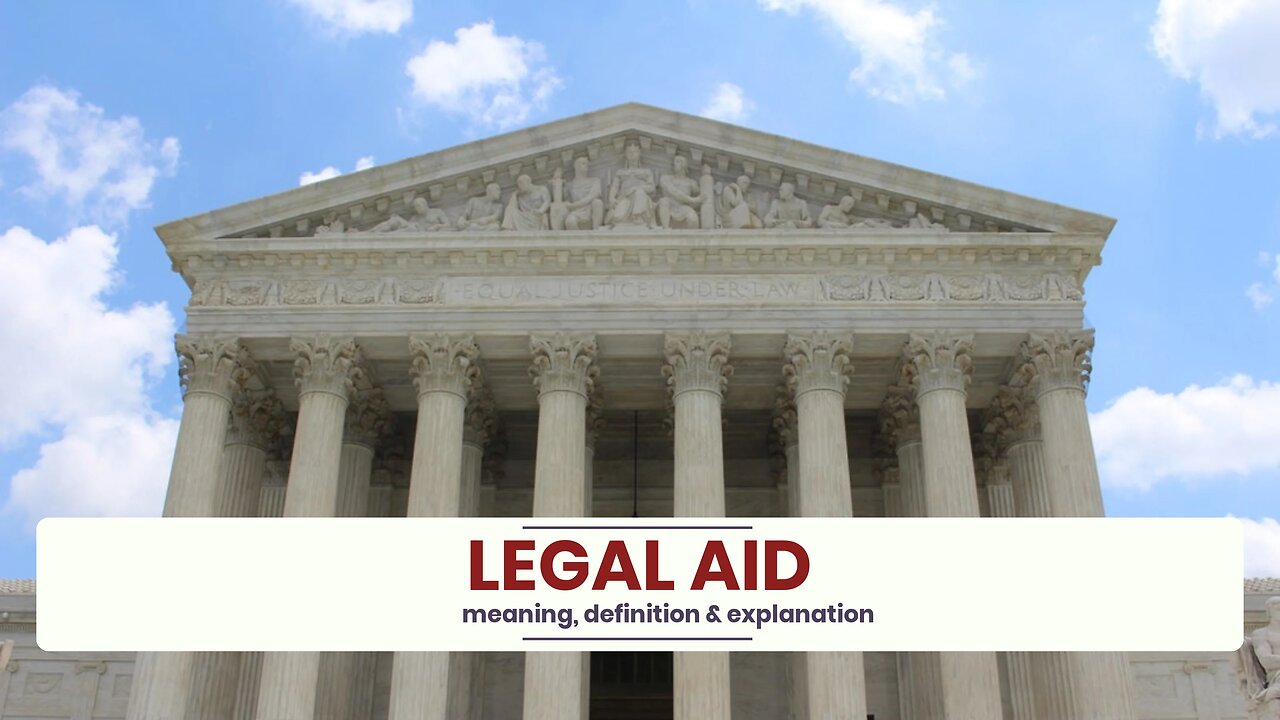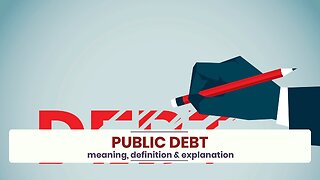Premium Only Content

What is LEGAL AID?
✪✪✪✪✪
http://www.theaudiopedia.com
✪✪✪✪✪
What does LEGAL AID mean? LEGAL AID meaning - LEGAL AID definition - LEGAL AID explanation. What is the meaning of LEGAL AID? What is the definition of LEGAL AID? What does LEGAL AID stand for? What is LEGAL AID meaning? What is LEGAL AID definition?
Legal aid is the provision of assistance to people otherwise unable to afford legal representation and access to the court system. Legal aid is regarded as central in providing access to justice by ensuring equality before the law, the right to counsel and the right to a fair trial. This article describes the development of legal aid and its principles, primarily as known in Europe, the Commonwealth of Nations and the United States.
A number of delivery models for legal aid have emerged, including duty lawyers, community legal clinics and the payment of lawyers to deal with cases for individuals who are entitled to legal aid.
Legal aid is essential to guaranteeing equal access to justice for all, as provided for by Article 6.3 of the European Convention on Human Rights regarding criminal law cases. Especially for citizens who do not have sufficient financial means, the provision of legal aid to clients by governments will increase the likelihood, within court proceedings, of being assisted by legal professionals for free (or at a lower cost) or of receiving financial aid.
Legal aid has a close relationship with the welfare state, and the provision of legal aid by a state is influenced by attitudes towards welfare. Legal aid is a welfare provision by the state to people who could otherwise not afford counsel from the legal system. Legal aid also helps to ensure that welfare provisions are enforced by providing people entitled to welfare provisions, such as social housing, with access to legal advice and the courts.
Historically legal aid has played a strong role in ensuring respect for economic, social and cultural rights which are engaged in relation to social security, housing, social care, health and education service provision, which may be provided publicly or privately, as well as employment law and anti-discrimination legislation. Jurists such as Mauro Cappelletti argue that legal aid is essential in providing individuals with access to justice, by allowing the individual legal enforcement of economic, social and cultural rights. His views developed in the second half of the 20th century, when democracies with capitalist economies established liberal welfare states that focused on the individual. States acted as contractors and service providers within a market-based philosophy that emphasised the citizen as consumer. This led to an emphasis on individual enforcement to achieve the realisation of rights for all.
Prior to the mid-20th century, literature on legal aid emphasised collective enforcement of economic, social and cultural rights. As classic welfare states were built in the 1940s and following World War II, an underlying principle was that citizens had collective responsibility for economic, social and cultural rights; and the state assumed responsibility for those unable to provide for themselves through illness and unemployment. The enforcement of economic, social and cultural rights was to be collective, through policies rather than individual legal action. Laws were enacted to support welfare provisions, though these were regarded as laws for planners, not lawyers. Legal aid schemes were established, as it was assumed that the state had a responsibility to assist those engaged in legal disputes, but they initially focused primarily on family law and divorce.
-
 1:41
1:41
The Audiopedia
9 months agoWhat is PUBLIC DEBT?
53 -
 2:34:48
2:34:48
Laura Loomer
9 hours agoEP112: MS-13 EVICTED By President Trump
57.1K32 -
 2:53:28
2:53:28
Toolman Tim
7 hours agoCommunity Gaming Night!! | Among Us
29K1 -
 2:34:47
2:34:47
GamerGril
7 hours agoMost Dangerous Gril This Side Of The Mississippi
23.7K3 -
 3:44:43
3:44:43
ZWOGs
7 hours ago🔴LIVE IN 1440p! - FiveM Fridays!! GTAV RP!! | Dwindle Digby | - Come Hang Out!
18.6K -
 2:05:43
2:05:43
TimcastIRL
9 hours agoTrump Admin Notifies Congress USAID Is CLOSED, Fires EVERYONE, ITS OVER w/Dan Holloway | Timcast IRL
218K156 -
 51:18
51:18
Man in America
13 hours agoClear Skies Coming? States Rally to Ban Geoengineering as RFK Jr. Calls Out ‘Toxic Dousing'
42.6K88 -
 2:22:55
2:22:55
BlackDiamondGunsandGear
13 hours agoThe time is NOW! / EDC / Preps / Load Out
18.3K -
 7:15:16
7:15:16
AirCondaTv Gaming
9 hours ago $0.47 earnedR.E.P.O. - Tonigth's Gonna Be a Good Night (Collab)
15.7K -
 2:03:06
2:03:06
Ninety7Bravo
8 hours ago🔴 LIVE | My First Look | Atomfall | 28 Mar 2025
18.5K